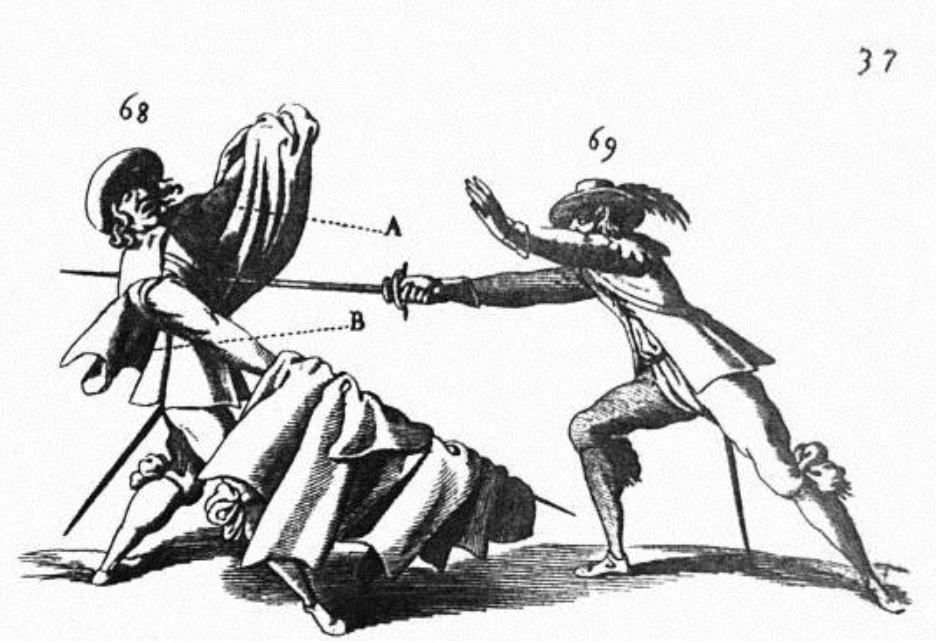The English Masters of Defence were very much a real and influential organisation in the Tudor and early Stuart era. Prior to 1645 England did not have a standing army of professional soldiers but relied on “voluntary” enlistment when a fighting force was required. Hence it was necessary to have a large number of well-trained men with the necessary fighting skills to call upon at any time.
Back in 1540 King Henry VIIIth was concerned that fighting standards were slipping so he granted the Company of the English Masters of Defence the rights to be the sole governing body for training in the martial arts. Now with the benefit of royal approval, The Masters of Defence were able to operate much like the other powerful trade Guilds. Just as you couldn’t call yourself a stonemason or a silversmith without undergoing an apprenticeship, thanks to Henry’s spot of royal intervention, you couldn’t call yourself a sword master unless you trained under a master and worked your way up through the ranks. There were four ranks in total.
1. Scholar. The beginner or entry level.
2. Free Scholar.
3. Provost, and then finally
4. Master. The most experienced instructor, skilled in multiple weapons and able to set up their own fencing school.
It could take up to seven years to reach the standard to be promoted from one rank to the next, a process which involved a candidate being nominated by a Master to fight in a Prize. (Trivia alert, this is where the term for a boxing Prize fight comes from.) Candidates were tested in a round of fights against other swordsmen who had already obtained the rank above. The weapons were blunted and blows were confined to above the waist, but the fighting was carried out at full speed, the aim being to fully test the skill and stamina of the candidate. With each level, the number and range of weapons increased, as did the expected degree of expertise.

In London fighting for The Prize was a very big event, starting with a parade through the streets. The Masters marched at the front of the parade with the candidates following behind, drums and trumpets announcing their progress and drawing in a large crowd. The Prize was open to the public for a fee, serving as entertainment and a means of raising funds, as well as a way to showcase the skill of the swordsmen and gather new recruits for the fencing schools where they trained. Prizes were usually held at one of the larger inns or theatres to accommodate the size of the audience. By the early 1600s The Curtain theatre in Shoreditch was a popular venue since the stage was wide and narrow with enclosed ends, making it a perfect piste for sword fighting, unlike a theatre such as The Globe where swordsmen could easily fall off the open ends.
Sometimes a Prize would be combined with an exhibition match called a Contest, a fight between experienced swordsmen fought with sharp and lethal weapons. For Londoners who had a keen appreciation of sword skills as well as a penchant for blood sports, the very real possibility of bloodshed, or someone losing an eye or a few fingers, only added to the allure. It’s not hard to imagine the heated atmosphere, the clang of swords on buckler shields, and the battle-scarred, seasoned fighters being cheered on by a raucous enthusiastic crowd as this account by a French traveler by the name of De Richefort describes with a dash of shock, gore, and hopefully a little exaggeration.
“ We went to see one combat, which was performed on a stage in the middle of the amphitheatre where on the flourishes of trumpets and the beat of drums drew their swords, and immediately began to fight, skirmishing a long time without any wounds . . . . The taller had the advantage, for according to the English style of fence they endeavored to cut than to push as seen in the Italian or Spanish style. . . . The tall one struck his antagonists wrist, which he almost cut off. But did not prevent him from continuing the fight . . . . The little man gave him a stroke which took off a slice of his head and almost his whole ear.”
De Richefort’s account certainly adds a new perspective to Shakespeare’s famous line,” lend me your ears.” You would hope there was some financial reward on offer by way of a ‘purse’, but then, who knows what a swordsman might do as a matter of honour and pride.
© 2022 All rights reserved
Made with ❤ in Australia